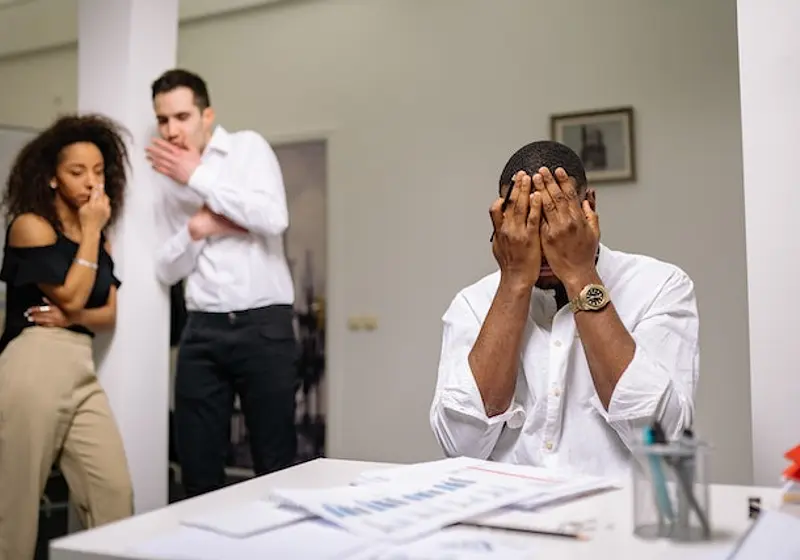I am terrible at confronting other people. I find it so, so difficult to stand up for myself without feeling guilty about it afterward. I convince myself that I overreacted, that they didn't mean it that way, that it wasn't such a big deal.
Those excuses fueled my fear of confrontation for a long time. For everyone else with the same fear of confrontation, this is for you: a guide to the complicated art of confronting someone without feeling guilty about it (as told by someone who has learned many ways to trick her overthinking brain).
1. Don’t confront other people when you’re too emotional to think straight
Although you shouldn’t postpone confronting someone else for too long, it’s a bad idea to do so when you’re feeling very emotional. Obviously, you might be riled up by the end of your conversation anyway, but it’s never good to start an argument because you’re too angry to have an actual conversation.
It’s much more likely that you’ll start firing accusations that may be true but don’t contribute anything to resolving the problem at hand and probably make it much, much worse. And, as I can say from first-hand experience, launching into a full-on shouting match will only make you feel more guilty after you have time to look back on it.
2. Write down the reasons why you feel upset
If you’re like me, starting a difficult conversation with someone is terrifying. You might immediately lose track of the things you want to say, which then makes you feel like maybe you were in the wrong, so you give up the argument altogether. I myself have gone through so many cycles of trying to start a conversation and then feeling like I’m the one making too big a deal out of everything but then feeling angry at myself for backing down so easily. It’s a vicious cycle.
To avoid it, start writing out bullet points about why you were upset before you go and talk to whoever was involved. List them out as reasonably as you can and think them over first. If you take the time to organize your thoughts before you confront someone, you’re less likely to believe you’re in the wrong halfway through the conversation. This works surprisingly well, so definitely try it out!
3. Hold yourself accountable
One problem I always had was postponing a confrontation over and over again until it was too late to say anything. Don’t do that. Of course, like in number one, don’t march over to have a conversation immediately, but also don’t push it back for weeks or months.
To prevent yourself from simply giving up on confronting someone once the anger has died down a little—which is something I go through every single time I’m upset with someone—hold yourself accountable. There are many ways to do that. Write notes to your future self explaining why you shouldn’t just ditch the conversation, ask someone else to force you into having the conversation—anything works! This may sound absolutely nuts, but it’s the hardest part of confronting someone: forcing yourself to go and do it.
4. Tell them what you want to change instead of complaining about what they’ve already done
Everyone screws up. There’s nothing you can do about it. And as cheesy as it sounds, the only thing you can do is stop it from continuing.
Telling someone what they did wrong is good, but going on and on about it resolves nothing and will probably annoy them. Instead, tell them what you want to change in the future. If you think there’s a lack of boundaries in your relationship, tell them that you want them to respect your personal space more from now on.
If you think they were insensitive about something important to you, tell them why you felt hurt and why it’s important that they don’t do it again. Focusing on the future and what they can change is much better and often much more successful than talking about what they did in the past.
Let us slide into your dms 🥰
Get notified of top trending articles like this one every week! (we won't spam you)What If You Can’t Resolve the Argument?
If you’re trying to have a legitimate, mature conversation and it’s going nowhere, you may just need to stop. Even though, for the most part, confrontations are for resolving problems and restoring relationships back to normal, sometimes things don’t go the way you planned.
If you’re being as honest and calm as you can and they just aren’t getting it, understand that this friendship or relationship is probably going nowhere and move on from it. And who knows, maybe they’ll think it over after the fact and realize that you did have a point—and all will be well.

Take the Quiz: What Type of Friend Are You in the Group Chat?
Are you the plan-maker, the official ghoster, or the chaotic energy that keeps things interesting? Let's find out what your messages say about you!
Confrontation Isn’t As Scary As It Seems
It may seem terrifying. And I can’t lie to you and say that it’s become easier and easier to sit down and have that awkward, kind-of-hostile conversation with someone. But you do improve at it over time. And what I’ve realized from forcing myself to stand up for myself and make myself heard is that nothing ever turns out as bad as it seems.
You might be afraid that confronting a close friend will ruin your relationship completely. But sometimes, taking the time to have a serious conversation will do wonders for your relationship. Keeping things pent up might feel less awkward and less difficult to begin with, but everything builds up in the end, and it’s much better to choose when you want to let it out instead of waiting for it to explode on you.
So yes, it’s scary, but no, it’s not the worst thing in the world. Just think through your thoughts and feelings beforehand, keep calm during your conversation, and just do it!














